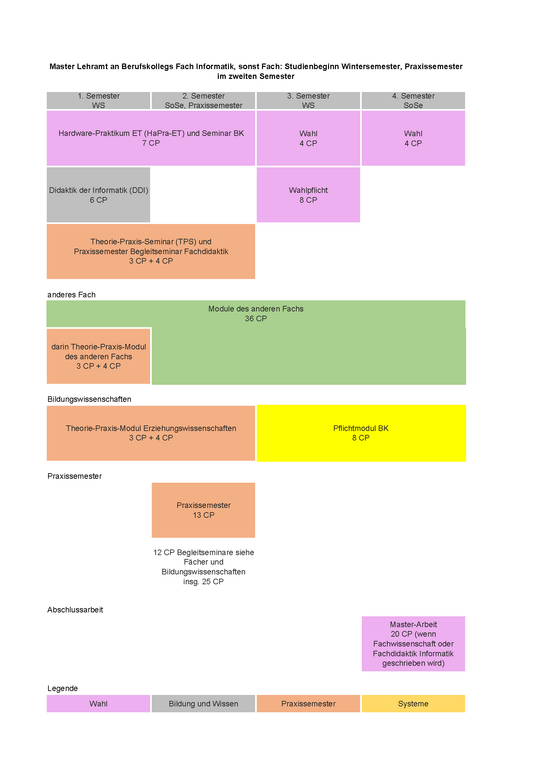Master's degree in Computer Science, other subject. Subject: Start of study in winter semester, practical semester in second semester
Study plans help you organize your studies. Please note the instructions for all study plans.
This study plan is of interest to you if you start your Master's studies in the winter semester and plan the internship semester for the second semester (summer semester).
Please consider the following plan as a recommendation and a suggestion to plan your studies.

Structure of the subject Computer Science for the teaching profession at vocational colleges (Master)
The courses you have taken in the subject of computer science in the bachelor's program and will take in this master's program will prepare you for the broad range of topics you will teach as a teacher at a vocational college.
In the elective and optional courses you can broaden and deepen your knowledge according to your inclinations. As one of the elective modules, Computer Science in Context addresses impacts of computer science on people's personal and professional lives. If you have not already taken Operating Systems in the Bachelor's program, you are advised to choose the course in this Master's program.
Finally, the courses on subject didactics prepare you for your role as a computer science teacher at a Gymnasium or comprehensive school.
In the practical semester, the second or third Master's semester, you will shift your place of learning from the university to a school and a Center for Practical Teacher Training (ZfsL), except for one "university day". Enrollment in the winter and summer semesters, as well as the option to complete the practical semester in the second or third semester, results in a variety of study plans. The practical phase is prepared by the subject didactics and the educational sciences and supervised together with the centers for practical teacher training (ZfsL) and schools.
Computer science as a school subject
Computer science is a general subject in all types of schools. At vocational colleges, computer science is also part of the professional knowledge taught. The unique features of computer science include the formal handling of data and information - comparable to the formula system of physics for forces and energy - as well as the analysis of problems, solutions and their efficiency.
An important question in computer science is which problems can be solved automatically and, if so, how efficiently. At the same time, computer science also offers students the opportunity to practically test their ideas by designing, programming, and evaluating computer programs.
"Computational thinking is a fundamental skill for everyone, not just for computer scientists. To reading, writing, and arithmetic, we should add computational thinking to every child's analytical ability." (Jeanette M. Wing)

![[Translate to English:] [Translate to English:]](/storages/zentraler_bilderpool/_processed_/d/f/csm_Informatik_275ba5e5fc.jpg)

![[Translate to English:] [Translate to English:]](/storages/zentraler_bilderpool/_processed_/1/b/csm_Figuren-nachdenklich_e2435967dd.jpg)
![[Translate to English:] [Translate to English:]](/storages/cs/_processed_/6/f/csm_teamwork1_e113f5f13b.png)
![[Translate to English:] [Translate to English:]](/storages/cs/_processed_/e/1/csm_header_ee496f74bf.png)